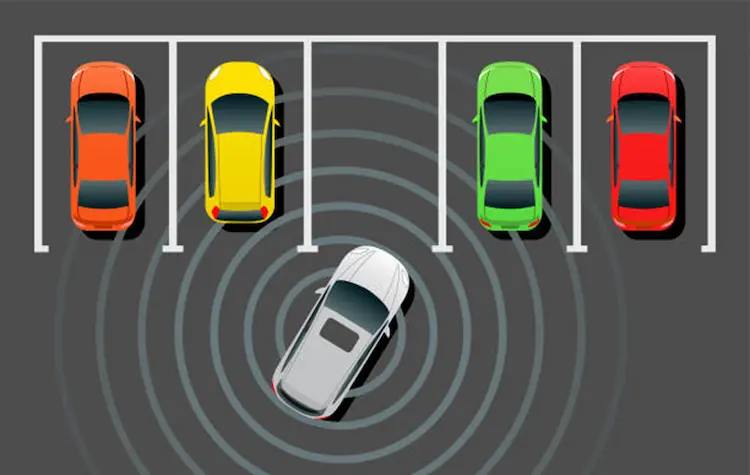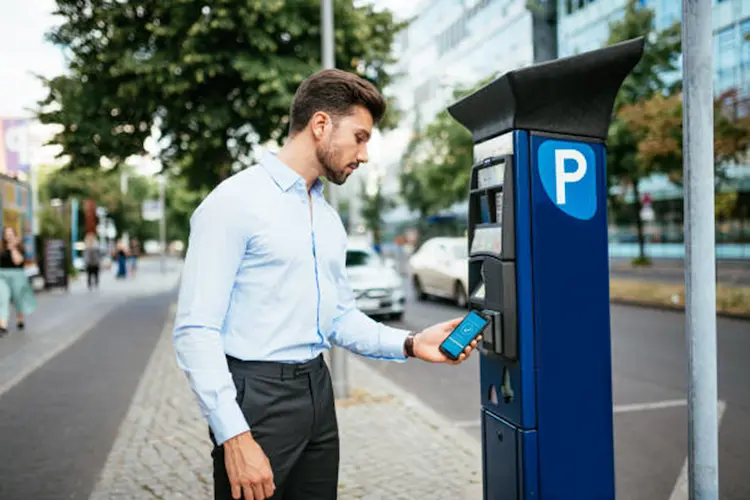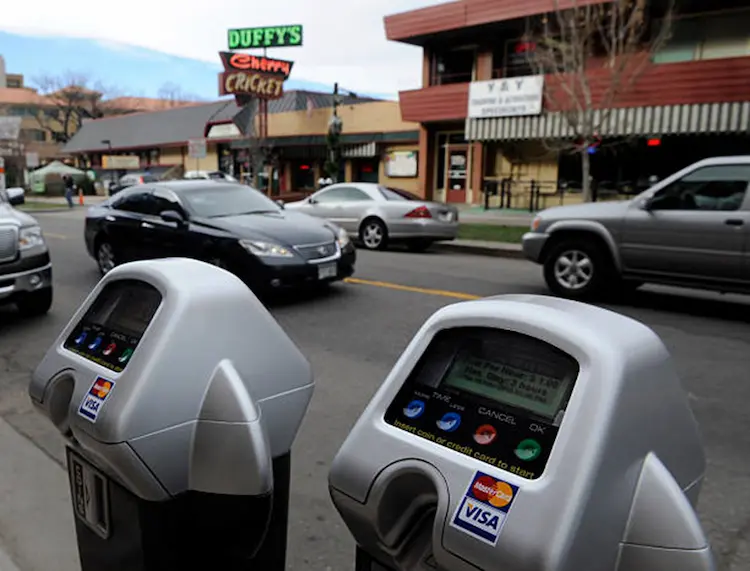Smart parking devices have transformed the way people park their automobiles. With the introduction of artificial intelligence (AI), technology has only improved. AI in smart parking systems has become the new norm, offering drivers a smooth and efficient parking experience.
Smart parking systems are the next step in parking management. It has gone a long way from the days of manually monitoring and directing traffic flow. Many people today use these systems to optimize resources further, enhance efficiency, and better regulate traffic.
This article presents an overview of AI-based video analytics smart parking systems. Smart parking systems, in particular, have developed as a solution for more efficient and effective car management, thanks to AI and video analytics technologies.

What Exactly Are Smart Parking Systems
Smart parking systems are a collection of technologies and solutions used to manage and optimize the usage of parking facilities to improve motorist efficiency and convenience. They often include sensors, software such as Wayleadr’s parking management system, user interfaces, payment systems, and further interaction with other management systems.
These parking systems are a complete and integrated approach to parking facility management that aims to improve the efficiency and convenience of the parking experience. These systems assist cities and operators in
- optimizing parking use
- reducing congestion
- improving the consumer experience by using technology and data.
Smart parking systems that use AI technology offer even greater benefits by incorporating advanced analytics and machine learning algorithms to develop more sophisticated and practical solutions.
What is Artificial Intelligence for Smart Parking Systems
AI for smart parking systems uses artificial intelligence and machine learning techniques in creating and using parking systems. These systems are intended to optimize parking and alleviate congestion, making parking simpler and more convenient for cars.
AI is becoming increasingly important in designing and implementing smart parking systems. AI systems examine data gathered by sensors and cameras to find trends and estimate future demand. This data is then used to optimize allocation and overall efficiency. Additionally, fees are adjusted in real-time to encourage drivers to park in less crowded areas.

Also Read: The Potential of Artificial Intelligence in the Automotive Industry
How Smart Parking System Function
Smart parking systems use hardware and software to manage parking operations and provide real-time parking availability information. The following components are commonly found on a service platform:
- Data collection: Parking infrastructure sensors and cameras collect data on parking occupancy and traffic movement. This information is forwarded to the service platform for processing and analysis.
- Data processing: The data is processed by the service platform, aggregating it into relevant information regarding parking availability and traffic flow.
- Data analysis: The service platform analyzes data in real-time using machine learning algorithms and other analytical tools to provide actionable insights to parking managers and operators.
- Data visualization: The service platform has an easy-to-use dashboard for getting to the data and ideas that the system generates and for seeing them. This enables these managers and operators to make educated parking decisions and adapt rapidly to changing situations.
Furthermore, the service platform is linked with other systems, such as payment and parking management software, to give users a comprehensive and seamless experience. The platform is reached through a web interface or a mobile app. Parking managers and operators are able to access the system’s data and information anywhere and anytime.
The Function of Sensors in Intelligent Parking Systems
Sensors play an essential function in intelligent parking systems. These devices collect information regarding availability, traffic flow, and weather conditions. The AI algorithms of the system then analyze this information to adjust operations in real-time.
Various sensors, including ultrasonic to detect vehicles, cameras to capture license plates, and weather sensors for environmental data, are used.

How Does ANPR/LPR Function in Intelligent Parking Systems
Automatic Number Plate Recognition (ANPR) or License Plate Recognition (LPR) systems use cameras and software to automatically identify and record vehicle license plate numbers. These systems are used to monitor the passage of vehicles into and out of parking spaces in intelligent parking systems.
License plate number and duration of stay are recorded when a vehicle enters and leaves a parking space, respectively, to determine the parking fee. Integrating ANPR/LPR systems with an authorized vehicle database reduces unauthorized parking and optimizes parking space usage.
This system provides
- real-time parking availability updates
- simplifies spot allocation
- helps reduce traffic for a smoother driving experience
What Do Intelligent Parking Systems Accomplish
Intelligent parking systems perform several essential duties that improve the effectiveness and convenience of parking operations. The following are some of the main features of intelligent parking systems.
- Real-time parking availability: They provide real-time information about parking availability, allowing drivers to find a parking space swiftly and effortlessly.
- Dynamic pricing: Smart parking systems help in altering the cost of parking based on demand and other variables in real time. This serves to optimize utilization and enhance customer satisfaction.
- Integration with payment systems: The system is integrated with payment systems, allowing drivers to pay for parking with various methods, such as credit cards, mobile payments, and smart cards.
- Space occupancy detection: Systems for intelligent parking use sensors or cameras to detect when a parking space is occupied or vacant, allowing for real-time monitoring of parking utilization.
These systems provide information regarding traffic flow, enabling cities and operators to manage traffic congestion better and reduce emissions from inactive vehicles.
Benefits of Intelligent Parking Systems
- Enhanced use of parking spaces
- Reduced traffic gridlock
- Superior customer service
- Enhanced profits for parking operators
- To improve air quality, reducing emissions from vehicles that are idling is essential
- Traffic flow management improvements
- Superior convenience
- Enhanced security
- Better data management

Benefits of AI-based Intelligent Parking Systems
With AI-based intelligent parking systems, additional capabilities become available, including:
- Improved predictive analytics
These systems incorporate the use of predictive analytics to forecast demand, allowing parking administrators to allocate resources more effectively and, as a result, maximize their utilization.
- Improved predictive maintenance
Similarly, it’s used to conduct predictive maintenance to proactively identify potential equipment failures, thereby reducing downtime and enhancing system dependability.
- Real-time monitoring
An intelligent parking system measures occupancy levels and other pertinent data in real time, offering a complete picture of parking situations. This facilitates improved decision-making for computers and operators.
- Vehicle recognition
Intelligent parking systems recognize vehicles using advanced computer vision algorithms derived from video analytics. This facilitates effective management.
- Customer insights
By using parking systems, it’s possible to gain valuable insights into customer behavior and preferences. This data is analyzed to help parking operators customize experiences and improve customer satisfaction.

What Developments and Trends are Anticipated for Smart Parking Systems in the Future
AI-powered parking systems show promising potential for the future as technology advances and the demand for efficient solutions grows. Here are some trends and innovations that are likely to shape the future of intelligent parking systems:
- Enhanced integration of IoT
Smart parking systems now become more incorporated with other Internet of Things (IoT) devices and systems, such as sensors, cameras, and connected vehicles, to provide a more comprehensive and unified parking experience.
- Intelligent video analytics parking systems
AI-based parking systems are improving at accurately detecting parking spots with the latest machine learning and computer vision tech. They’ll also use advanced analytics to provide deeper insights into parking patterns and trends.
- Increased cloud computing adoption
Video analytics parking systems powered by AI increasingly use cloud computing which enhances their scalability, flexibility, and cost-effectiveness.
- Integration with autonomous vehicles
As autonomous vehicles become more prevalent, AI-based video analytics parking systems are incorporated. This allows autonomous vehicles to park and charge automatically and enhancing the efficacy and convenience of parking operations.
Autonomous vehicles are able to operate independently, eliminating the need for drivers to seek parking spaces and streamlining parking operations. Dynamic Parking Management results from autonomous vehicles’ ability to adapt their real-time parking behavior to changing conditions, such as occupancy levels, time of day, and weather.
As autonomous and electric vehicles become more prevalent, the demand for electric charging stations is likely to increase. Self-parking autonomous vehicles provide passengers with a more convenient and organized driving experience, as they eliminate the need for manual intervention.
- Increasing adoption in developing countries
Video analytics-based parking systems are becoming more popular in developing countries. They offer affordable and efficient parking options for growing urban communities.
- Enhanced customization
Smart parking systems become more personalized as technology advances, providing drivers with information and guidance based on their specific requirements and preferences.

Smart Parking Technologies Address the Rising Problem of Parking Automobiles
AI-powered parking systems help cities and businesses reduce expenses, improve user experience, and manage vehicles more efficiently for more sustainable and efficient cities. These smart parking systems are the future of parking management. They’re efficient, productive and represent a step forward in modernizing the industry.